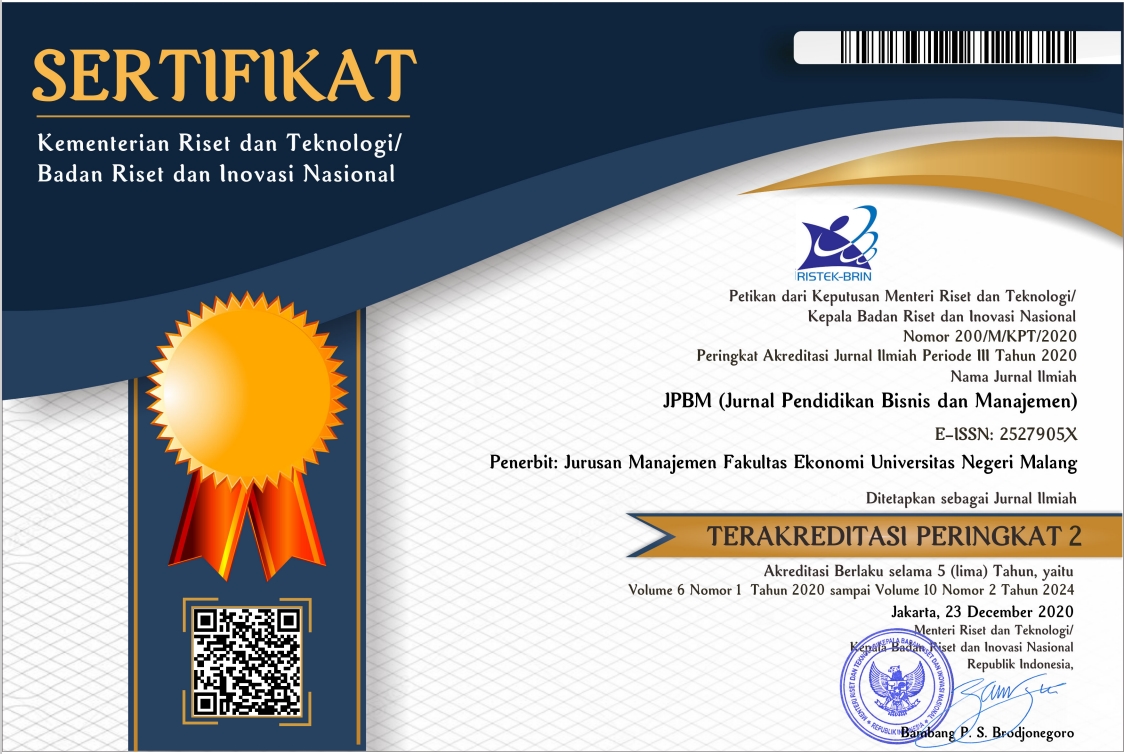Work-Family Conflict, Readiness for Change and Employee Performance Relationship During the Covid-19 Pandemic
Abstract
This study aimed to measure the effect of work-family conflict on employee performance of the part-time employee of a packaging industry in Tangerang which are mediated by readiness for change. Data collection was done by simple random sampling technique and the returned and valid questionnaire results were 143 participants. Data processing was used SEM method with SmartPLS 3.0 software. The results of this study concluded that work-family conflict have negative and significant effect on the employee performance, but work-family conflict have a positive and significant effect on readiness for change. Also, this research found that readiness for change have a positive and significant effect on relationship work-family conflict and employee performance. Readiness for change as fully mediator. This new research proposed a model for building employee performance among the part-time employee of a packaging industry in Tangerang through enhancing work-family conflict management practice with readiness for change as a mediator. This research could pave the way to improve employee readiness in facing the era of industrial revolution 4.0.
Keywords: Employee Performance, Readiness for Change, Work-Family Conflict
Keywords
Full Text:
PDFReferences
Ahmad, A. (2008). Job, family and individual factors as predictors of work-family conflict. The Journal of Human Resource and Adult Learning, 4(1), 57–65.
Alvesson, M., & Sveningsson, S. (2015). Changing organizational culture: cultural change work in progress. Routledge.
Andrews, T., Elizalde, B., Le Billon, P., Oh, C. H., Reyes, D., & Thomson, I. (2017). The rise in conflict associated with mining operations: What lies beneath?. Canadian International Resources and Development Institute (CIRDI), 1-127.doi: 10.13140/RG.2.2.36488.62720
Asbari, M., Bernarto, I., Pramono, R., Purwanto, A., Hidayat, D., Sopa, A., … Mustofa. (2020). The effect of work-family conflict on job satisfaction and performance: A study of indonesian female employees. International Journal of Advanced Science and Technology, 29(3), 6724–6748.
Asbari, M., Pramono, R., Kotamena, F., Liem, J., Sihite, O. berman, Alamsyah, V. U., … Purwanto, A. (2020). Studi fenomenologi work-family conflict dalam kehidupan guru honorer wanita. Edumaspul: Jurnal Pendidikan, 4(1), 180–201. doi: 10.33487/edumaspul.v4i1.347
Astuti, E., & Khoirunnisa, R. M. (2020). Pengaruh employee engagement, komitmen organisasi, dan kepemimpinan transformasional terhadap kesiapan untuk berubah (readiness for change) pada karyawan Universitas Ahmad Dahlan. Jurnal Fokus Manajemen Bisnis, 8(1), 47–66. doi: 10.12928/fokus.v8i1.1581
Banjongprasert, J. (2017). An assessment of change-readiness capabilities and service innovation readiness and innovation performance: Empirical evidence from MICE venues. International Journal of Economics and Management, 11, 1–17.
Braun, S., & Nieberle, K. W. A. M. (2017). Authentic leadership extends beyond work: A multilevel model of work-family conflict and enrichment. The Leadership Quarterly, 28(6), 780–797. doi: 10.1016/j.leaqua.2017.04.003
Chin, W. W. (1998). The partial least squares approach for structural equation modeling. In Methodology for Business and Management. Modern methods for business research (pp. 295–336). Mahwah, NJ, US: Lawrence Erlbaum Associates Publishers.
Crosbie, T., & Moore, J. (2004). Work-Life Balance and Working from Home. Social Policy and Society, 3, 223–233. doi: 10.1017/S1474746404001733
Dai, Y.-D., Chen, K.-Y., & Zhuang, W.-L. (2016). Moderating effect of work–family conflict on the relationship between leader–member exchange and relative deprivation: Links to behavioral outcomes. Tourism Management, 54, 369–382. doi: 10.1016/j.tourman.2015.12.005
Fitriana, R., & Sugiyono. (2019). Kesiapan berubah pada Sekretariat Jenderal Kementerian Kelautan dan Perikanan Republik Indonesia. IKRA-ITH Ekonomika 2(2), 42–51.
Fornell, C., & Larcker, D. F. (1981). Evaluating structural equation models with unobservable variables and measurement error. Journal of Marketing Research, 18(1), 39. doi: 10.2307/3151312
Geroda, M. K. B., & Puspitasari, E. (2017). The impact of work-family conflict toward job performance – the case of external auditor. The 3rd PIABC (Parahyangan International Accounting and Business Conference.
Ghozali, I. (2012). Aplikasi Analisis Multivariate dengan Program IBM SPSS 19 -5/E. Badan Penerbit Universitas Diponegoro.
Goudarzi, M., Khodayar, M. J., Tabatabaei, S. M. T. H., Ghaznavi, H., Fatemi, I., & Mehrzadi, S. (2017). Pretreatment with melatonin protects against cyclophosphamide-induced oxidative stress and renal damage in mice. Fundamental & Clinical Pharmacology, 31(6), 625–635. doi: https://doi.org/10.1111/fcp.12303
Gözükara, İ., & Çolakoğlu, N. (2016). The mediating effect of work family conflict on the relationship between job autonomy and job satisfaction. Procedia - Social and Behavioral Sciences, 229, 253–266. doi: 10.1016/j.sbspro.2016.07.136
Greenhaus, J. H., & Beutell, N. J. (1985). Sources and conflict between work and family roles. The Academy of Management Review, 10(1), 76–88. doi: 10.2307/258214
Hair, J., Hult, G. T. M., Ringle, C. M., & Sarstedt, M. (2013). A Primer on Partial Least Squares Structural Equation Modeling (1st edition). Los Angeles: SAGE Publications, Inc.
Holt, D. T., Armenakis, A. A., Feild, H. S., & Harris, S. G. (2007). Readiness for Organizational Change: The Systematic Development of a Scale. The Journal of Applied Behavioral Science, 43(2), 232–255. doi: 10.1177/0021886306295295
Huges, N., & Muñoz Guzmán, C. (2016). Understanding and supporting families with complex needs.
Kasper, H., Meyer, M., & Schmidt, A. (2005). Managers dealing with work-family-conflict: An explorative analysis. Journal of Managerial Psychology - J MANAG PSYCHOL, 20, 440–461. doi: 10.1108/02683940510602978
Katsaros, K. K., Tsirikas, A. N., & Kosta, G. C. (2020). The impact of leadership on firm financial performance: The mediating role of employees’ readiness to change. Leadership & Organization Development Journal, 41(3), 333–347. doi: 10.1108/LODJ-02-2019-0088
Kremer, I. (2016). The relationship between school-work-family-conflict, subjective stress, and burnout. Journal of Managerial Psychology, 31, 805–819. doi: 10.1108/JMP-01-2015-0014
Lyu, X., & Fan, Y. (2020). Research on the relationship of work family conflict, work engagement and job crafting: A gender perspective. Current Psychology, 1, 11. doi: 10.1007/s12144-020-00705-4
Mahessa, N. F., & Nrh, F. (2017). Gaya kepemimpinan melayani dan kesiapan untuk berubah pada karyawan BPJS ketenagakerjaan. Jurnal EmpatI, 5(1), 113–116.
Mansour, S., & Tremblay, D.-G. (2016). Workload, generic and work–family specific social supports and job stress: Mediating role of work–family and family–work conflict. International Journal of Contemporary Hospitality Management, 28(8), 1778–1804. doi: 10.1108/IJCHM-11-2014-0607
Mauno, S., & Ruokolainen, M. (2017). Does organizational work–family support benefit temporary and permanent employees equally in a work–family conflict situation in relation to job satisfaction and emotional energy at work and at home? Journal of Family Issues, 38(1), 124–148. doi: 10.1177/0192513X15600729
Netemeyer, R. G., Boles, J. S., & McMurrian, R. (1996). Development and validation of work–family conflict and family–work conflict scales. Journal of Applied Psychology, 81(4), 400–410. doi: 10.1037/0021-9010.81.4.400
Poduval, J., & Poduval, M. (2009). Working mothers: How much working, how much mothers, and where is the womanhood? Mens Sana Monographs, 7(1), 63–79. doi: 10.4103/0973-1229.41799
Ru Hsu, Y. (2011). Work‐family conflict and job satisfaction in stressful working environments: The moderating roles of perceived supervisor support and internal locus of control. International Journal of Manpower, 32(2), 233–248. doi: 10.1108/01437721111130224
Sharma, N., Chakrabarti, S., & Grover, S. (2016). Gender differences in caregiving among family—Caregivers of people with mental illnesses. World Journal of Psychiatry, 6(1), 7–17. doi: 10.5498/wjp.v6.i1.7
Sultana, A. (2010). Patriarchy and women's subordination: A Theoretical Analysis. Arts Faculty Journal, 1–18. doi: 10.3329/afj.v4i0.12929
Sutardi, D., Novitasari, D., Asbari, M., Silitonga, N., Nugroho, Y. A., Hutagalung, D., … Yuwono, T. (2020). Pengaruh work-family conflict, stres kerja dan social support terhadap kepuasan kerja: Studi kasus pada Guru wanita di Tangerang. EduPsyCouns: Journal of Education, Psychology and Counseling, 2(1), 482–498.
Vickovic, S. G., & Morrow, W. J. (2020). Examining the influence of work–family conflict on job stress, job satisfaction, and organizational commitment among correctional officers. Criminal Justice Review, 45(1), 5–25. doi: 10.1177/0734016819863099
Yuwono, T., Novitasari, D., Sutardi, D., Mustofa, M., & Asbari, M. (2020). Peran organizational commitment terhadap hubungan work-family conflict dan kepuasan kerja karyawan wanita di Kota Seribu Industri Tangerang. EduPsyCouns: Journal of Education, Psychology and Counseling, 2(1), 524–540.
Zhang, M., Griffeth, R., & Fried, D. (2012). Work-family conflict and individual consequences. Journal of Managerial Psychology, 27, 696–713. doi: 10.1108/02683941211259520
DOI: http://dx.doi.org/10.17977/um003v6i22020p067
Refbacks
- There are currently no refbacks.
JPBM (Jurnal Pendidikan dan Bisnis Manajemen) is licensed under a Creative Commons Attribution-NonCommercial-ShareAlike 4.0 International License.
JPBM (Jurnal Pendidikan dan Bisnis Manajemen) is abstracted and indexed in :
















